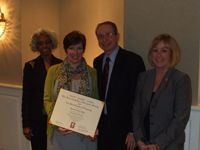On the front lines
Posted: November 5, 2009
Professor part of newforce of healthcare leaders
The healthcare arena is a battlefield, and one KCOM professor is arming herself for the fight.
As part of the competitive, yearlong American Osteopathic Association (AOA) Heath Policy fellowship, Associate Professor Trish Sexton, D.H.Ed., began her training with a five-day boot camp in August 2008, followed by nine three-day weekend sessions hosted by osteopathic colleges across the country, as well as the offices of the American Association of Colleges of Osteopathic Medicine and the AOA.
Between seminars, she spent at least 20 hours each week completing extensive reading assignments and researching and writing two issue analysis briefs, supervised by faculty experts in health policy.
Her mission: to learn more about the inner-workings of the healthcare industry, become a leader in the osteopathic profession, serve as a local policy expert, and seize opportunities to influence health policy.
Modeled after the Robert Wood Johnson Health Policy Fellowship, the AOA program was created in 1994 by Barbara Ross-Lee, D.O., FACOFP, the first African-American dean of an American osteopathic medical school. Dr. Ross-Lee saw a need for education within the profession, formed and brought in policy leaders, and began attracting D.O.s and osteopathic leaders who could improve the profession by understanding policy and politics at a higher level.
Coordinated by the New York Institute of Technology’s New York College of Osteopathic Medicine and the Ohio University College of Osteopathic Medicine, the prestigious fellowship offers 15 hours of graduate credit. Its graduates make up nearly half the AOA House of Delegates and serve on the AOA Board of Trustees, and nine of them have gone on to become deans of colleges of osteopathic medicine.
Dr. Sexton, who focused her learning on the impact of education on health, wanted to take on the fellowship to learn about an unfamiliar area of healthcare – to her and her students.
“These are not topics we usually study, and the fellowship has definitely changed who I am and the way I think. Having a structured way to learn it and to visit sister schools and learn from them were unintended benefits. It’s important for our students to understand these topics,” says Sex- ton, who wrote new policy modules for KCOM’s societies, as well as an elective course with a policy foundation upon graduation.